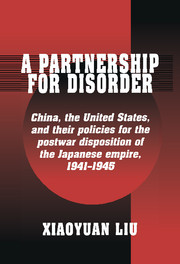 A Partnership for Disorder
A Partnership for Disorder Book contents
- Frontmatter
- Contents
- Acknowledgments
- Note on romanization
- Abbreviations
- Introduction
- 1 The making of an alliance
- 2 The issue of postwar Japan
- 3 China's lost territories
- 4 Korea's independence
- 5 The road to Cairo
- 6 A divisive summit
- 7 Yan'an and postwar East Asia
- 8 Diplomacy without action
- 9 Erosion of a partnership
- 10 The Manchurian triangle
- 11 Bargaining at Moscow
- 12 Epilogue: The crisis of peace
- Appendix I Guiding Plan for Helping the Korean Restoration Movement
- Appendix II Two Chinese documents of the Cairo Conference
- Bibliography
- Index
1 - The making of an alliance
Published online by Cambridge University Press: 20 October 2009
- Frontmatter
- Contents
- Acknowledgments
- Note on romanization
- Abbreviations
- Introduction
- 1 The making of an alliance
- 2 The issue of postwar Japan
- 3 China's lost territories
- 4 Korea's independence
- 5 The road to Cairo
- 6 A divisive summit
- 7 Yan'an and postwar East Asia
- 8 Diplomacy without action
- 9 Erosion of a partnership
- 10 The Manchurian triangle
- 11 Bargaining at Moscow
- 12 Epilogue: The crisis of peace
- Appendix I Guiding Plan for Helping the Korean Restoration Movement
- Appendix II Two Chinese documents of the Cairo Conference
- Bibliography
- Index
Summary
A “matter not of principle but of expediency,” alliance making in the history of international relations often encompasses strange bed fellows. The American–Chinese alliance during World War II represented an unprecedented degree of cooperation between two very different countries. Until the war, the only parallel between American and Chinese histories took place in the mid-1860s, when both countries emerged from their civil wars. In China a peasants' “Heavenly Kingdom of Grand Peace” was suppressed, and in the United States the southern Confederacy was defeated. But the connotations of the two events cannot plausibly stand comparison. The rest of the nineteenth century found the United States and China moving in opposite directions. At a time when the United States was emerging as one of the dominant powers of the world, the Chinese Empire was suffering from political erosion and was on the brink of collapse. During the first few decades of the twentieth century, the Chinese–American relationship was cemented by the old “treaty system” in China and its recent corollaries that indicated the gap rather than the common interests of the two nations. Then, between 1937 and 1941, Japan's aggressive policy to seal the Asian–Pacific region for itself unwittingly helped bridge the distance between China and the United States. After the militarists in Tokyo masterminded the Pearl Harbor attack, leaders in Washington and Chongqing forged an alliance. The war in the Pacific revolutionized the international relations of East Asia, but it could not change the fundamental characteristics of the nations involved.
- Type
- Chapter
- Information
- A Partnership for DisorderChina, the United States, and their Policies for the Postwar Disposition of the Japanese Empire, 1941–1945, pp. 10 - 36Publisher: Cambridge University PressPrint publication year: 1996


